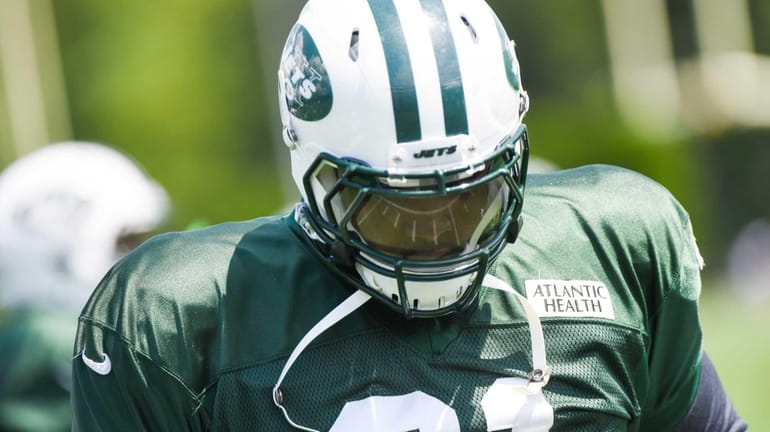Jets coach Todd Bowles sees Sheldon Richardson at a crossroads

New York Jets defensive end Sheldon Richardson practices during training camp at the team's practice facility in Florham Park, N.J. on Saturday, Aug. 1, 2015. Credit: Andrew Theodorakis
Sheldon Richardson presents yet another case of a professional athlete engaging in the kind of behavior that makes you wonder just what is going on inside his head. It is something Todd Bowles has seen time and time again as an NFL player, assistant coach and, now, Richardson's head coach.
The Jets defensive tackle was arrested on July 14 and charged with resisting arrest and endangering the welfare of a child after, according to police in St. Charles County, Missouri, he drove at 143 miles per hour while racing another vehicle on a highway. Inside his 2014 Bentley were two other men and a 12-year-old child.
The arrest occurred less than two weeks after Richardson was suspended for four games by the NFL for violating the league's substance-abuse policy.
All of it is head-shaking stuff from a 24-year-old player with all the money and the world in the palm of his hand.
"He's 24 and so many of them fall by the wayside," Bowles said outside the Jets' training facility after practice Friday. "He has a good heart and he's a good person, but he's done some bad things. No doubt about it."
Bowles can't begin to count the number of players who have made similarly bad choices over the years. He was an NFL safety in the 1980s and '90s, when you didn't always hear about players who had run afoul of the law. The drug-testing policy was in its infancy, and many off-field incidents often were overlooked or underpublicized.
How many players got in trouble during Bowles' days with Washington and San Francisco?
"I have a whole list, and we'd be out here all day," he said. "Nobody cared back then. Now it's a big deal."
Now it's a very big deal. Off-field behavior has come under tremendous scrutiny. The league has strengthened its drug policy over the years and commissioner Roger Goodell has placed increased importance on the league's Personal Conduct Policy.
If you screw up, you're going to be taken off the field for a period of time. And chances are Goodell will add some games -- maybe several more games -- to Richardson's four-game ban.
Bowles believes Richardson is at a crossroads. He said he has seen it all too often, with some players failing to mature and ruining their lives and others getting it together and leading productive lives both during and after their careers are over.
Bowles offers a unique insight into what gets some players in trouble.
"I've seen players go both ways," he said. "As a player, your stubbornness is what gets you to be successful. But it's also the thing that makes you fail, because no one can tell you 'no,' not even yourself."
And when that sort of player does get into trouble, he doesn't know where to turn.
"You don't know where to go for help, because you've always been the alpha dog," Bowles said. "The alpha dog never looks for help. He'd rather die than look for help. But sometimes you have to put your pride aside, and sometimes you have to go so low to see that."
So this is not about Richardson the player. It is about Rich- ardson the man.
"It's a learning lesson,'' Bowles said, "but hopefully, and most importantly, it's a lesson for Sheldon to get better."
Richardson was lucky that nothing tragic took place when he allegedly raced down the highway and put the lives of himself and his passengers at risk.
Another player from Bowles' era, Eagles defensive tackle Jerome Brown, wasn't so lucky. The former Pro Bowl tackle and his 13-year-old nephew were killed on June 25, 1992, when, police said, Brown lost control of his Corvette and was involved in a high-speed crash into a utility pole in Brooksville, Florida. Brown was 27.
Richardson said he gets it now. Only time will tell if he truly does.
"I let [the Jets' organization] down, simple as that," he said. "I'm not afraid to say that . . . This is a wake-up call."
"He has to own up to his mistakes, he has to face his peers, he has to face his family and he has to become a better man," Bowles said. "We have to work on him becoming a better man. Whatever happens career-wise will take care of itself. But you have to become a better man."
Now it's up to Richardson to make the choice: He either owns up to his problem and gets the help he needs -- and he does need help, regardless of whether he admits it or not -- or he joins the long list of players who ruin their opportunity.

